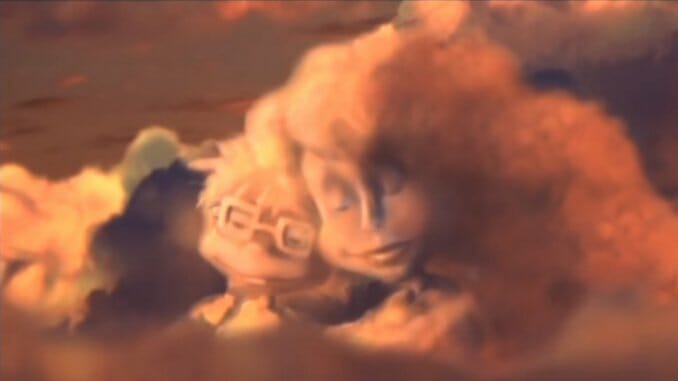Quaran-Scenes: “I Want a Mom That Will Last Forever” in Rugrats in Paris

In Quaran-Scenes, writers take a look at some of their favorite scenes from cinema; how and why they “work,” and what about those scenes they love so much. Find past columns here.
![]()
Rugrats in Paris is bookended, fittingly, by weddings.
Bookended, at least, by successful ones. Yet, failed romances and fictional characters—the ones people create for others in their daily lives, and the kind that populate cultural mythologies and stories as iconography—litter the streets of Paris. That these things masquerading as functional substitutes for intimacy or love root themselves in Paris, or a version of it, is not lost on the film. Without raining on the romance of the City of Lights entirely, a French woman angles to marry an American man so she can climb the corporate ladder of a Japanese conglomerate hawking the kaiju-esque Reptar. The ensuing wedding—in Notre Dame, no less—is called off, partially aided by an American brat and a put-upon Japanese assistant. But, sticking to what worked, Rugrats in Paris is bookended by weddings that are set Somewhere in the United States—and, as if to underline a simultaneous skepticism of Parisian romantic mythology and curiosity about an “American” “melting pot” being a more reliable foundation for love, also nods to Francis Ford Coppola’s The Godfather.
When a mother/child dance starts up at the wedding at the beginning of Rugrats in Paris, ginger baby Chuckie looks through the din, crowded by a love not meant for him, craving closeness he’s never really felt. It’s a seed of hunger that blooms within him as an inexplicable broken heart. Where a Rugrats movie would be easy to write off as child’s play, Rugrats in Paris clearly and sharply makes its preoccupation how children negotiate loss. Chuckie, last of the babies lining the hallway for consultation, makes his request to “The Bobfather,” aka Angelica, for a mother. Tommy asked for a binky for Dill, but Chuckie, allowing himself to be vulnerable, asks for something grander; even he doesn’t necessarily quite understand the scale of his plea. That his appeal is inextricable from an idea of family makes its Godfather connection less an infantile parody and instead a thematic baby-based doppelganger.
The secret genius of Rugrats—created by Arlene Klasky, Gábor Csupó, Paul Germain in 1991 and arguably Nickelodeon’s cash cow precursor to the SpongeBob phenomenon—is that it was always more of an adult sitcom whose characters happened to be toddlers…an observation that our parents probably held closely. From jokes about a failed sexual revolution to plotlines about the babies unionizing/striking against an exploitative Angelica, Rugrats’ rhythm and sensibility seemed to have an innate absurdity that (if you looked close enough at it as an adult) would be hard to distinguish from well-regarded sitcoms of the ‘90s, save for the baby talk.
So, the film’s riff on The Godfather is up its alley not because the show felt compelled to lampoon classic pop culture properties in a Mad Magazine-esque way, but because it knew how to make its joke feel like part of its DNA. Rugrats was always concerned with family, and the fluid version of it that young children conceive of—perhaps not unlike Mario Puzo and Coppola’s films. But Rugrats in Paris deliberately pivots to an aspect that was both deeply embedded in the series as a possible thread and one that was not the focus of The Godfather: Motherhood, especially from the perspective of a child.
-

-

-

-

-

-

-

-

-

-

-

-

-

-

-

-

-

-

-

-

-

-

-

-

-

-

-

-

-

-

-

-

-

-

-

-

-

-

-

-








































